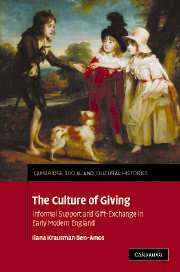Book contents
- Frontmatter
- Contents
- List of illustrations
- List of tables
- Acknowledgements
- List of abbreviations
- Introduction
- Part I Social spaces and reciprocities
- Part II The economy of giving
- Part III The state, markets and gifts
- 9 Evolving boundaries
- 10 The invigoration of informal support
- Conclusion
- Bibliography
- Index
9 - Evolving boundaries
Published online by Cambridge University Press: 04 May 2010
- Frontmatter
- Contents
- List of illustrations
- List of tables
- Acknowledgements
- List of abbreviations
- Introduction
- Part I Social spaces and reciprocities
- Part II The economy of giving
- Part III The state, markets and gifts
- 9 Evolving boundaries
- 10 The invigoration of informal support
- Conclusion
- Bibliography
- Index
Summary
The support systems and cycles of gifts that are the focus of this book were for the most part maintained outside the purview of state institutions, legal developments or the marketplace. They involved the exchange of goods and the offering of donations and handouts – considered freely given or exchanged – that were beyond the scope of the poor laws and the compulsory rates. Acts of giving were reinforced by practices and norms rather than by formal regulations and rules, engaging individuals and groups in interactions that did not require the interference of state agents, banks or insurance agencies. They typically involved non-market transactions, whereby the participants became involved in reciprocities and durable interactions in which a host of social and cultural assets became enmeshed over and above money and material goods. Despite varied perils, informal support remained vigorous, with many practices of giving – in parishes, associations or amidst social networks – mutating and expanding over time.
This viability of varied support systems, in a period that witnessed vast transformations relating to state formation, expanding markets and growing urban populations, suggests that for all their personal, voluntary (or semi-voluntary), non-market features, the support systems and gift offerings we are here studying were not wholly inimical to market transactions or state governance and institutions, nor did they necessarily retreat under their impact.
- Type
- Chapter
- Information
- The Culture of GivingInformal Support and Gift-Exchange in Early Modern England, pp. 309 - 332Publisher: Cambridge University PressPrint publication year: 2008

